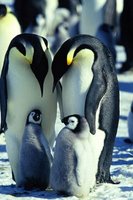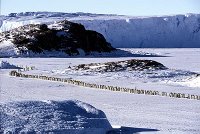 I watched "March of the Penguins" last night, for the first time, and was so incredibly moved by the story of these truly amazing creatures. It was nominated for and won a slew of awards including an Academy Award, in 2005, for Best Feature Documentary, and understandably so.
I watched "March of the Penguins" last night, for the first time, and was so incredibly moved by the story of these truly amazing creatures. It was nominated for and won a slew of awards including an Academy Award, in 2005, for Best Feature Documentary, and understandably so.Director Luc Jaquet spent 12 months in the Antarctic filming the Emperor Penguins and their annual 50 to 70 mile trek to their breeding grounds where they court, mate, hatch one egg and raise their hatchling until it is old enough to go off on its own; that is, if they all survive which, considering what they have to endure, is a major achievement.
They start their trek in March (the beginning of the Antarctic winter) from the sea, and journey inland to their ancestral breeding grounds.  Emperor penguins have done this for centuries, walking single file, sometimes sliding on their bellies, until they reach their destination where the courtship, mating and nesting take place. Several months after conception, each female lays one egg which she then carefully transfers to her mate to safeguard while she makes the long trek back to the ocean to feed. After months without food they need to not only nourish themselves, but provide food for their babies, upon their return.
Emperor penguins have done this for centuries, walking single file, sometimes sliding on their bellies, until they reach their destination where the courtship, mating and nesting take place. Several months after conception, each female lays one egg which she then carefully transfers to her mate to safeguard while she makes the long trek back to the ocean to feed. After months without food they need to not only nourish themselves, but provide food for their babies, upon their return.
 Emperor penguins have done this for centuries, walking single file, sometimes sliding on their bellies, until they reach their destination where the courtship, mating and nesting take place. Several months after conception, each female lays one egg which she then carefully transfers to her mate to safeguard while she makes the long trek back to the ocean to feed. After months without food they need to not only nourish themselves, but provide food for their babies, upon their return.
Emperor penguins have done this for centuries, walking single file, sometimes sliding on their bellies, until they reach their destination where the courtship, mating and nesting take place. Several months after conception, each female lays one egg which she then carefully transfers to her mate to safeguard while she makes the long trek back to the ocean to feed. After months without food they need to not only nourish themselves, but provide food for their babies, upon their return.While the females are gone, the males must endure the severe winter blizzards standing huddled together to provide warmth. With the egg nestled on top of their claws and underneath a flap of feathered skin called a brood pouch, they carefully protect the egg they have been entrusted with. They can not let the egg fall or it could crack or freeze before it is has hatched. Several months later the females return, fully fed and thus able to feed their babes, which have, by then, hatched.
 The males, after 4 months without sustenance, begin their trek in search of food. This time their trip is not so long. With the commencement of spring and then summer, the ice begins to melt and the distance between the breeding grounds and the water's edge decreases. They return after several weeks and then the male and female alternate searching for food to provide for their chicks. They feed their young by regurgitating a milky substance into their open beaks. After several more months, when the penguins are old enough to fend for themselves, they all return to the sea. The young penguins will wait 4 or 5 years before they embark on this yearly trek.
The males, after 4 months without sustenance, begin their trek in search of food. This time their trip is not so long. With the commencement of spring and then summer, the ice begins to melt and the distance between the breeding grounds and the water's edge decreases. They return after several weeks and then the male and female alternate searching for food to provide for their chicks. They feed their young by regurgitating a milky substance into their open beaks. After several more months, when the penguins are old enough to fend for themselves, they all return to the sea. The young penguins will wait 4 or 5 years before they embark on this yearly trek.I think what struck me the most was the total and absolute devotion these animals have for their young; their willingness to endure such extreme and almost unbearable hardship to ensure their offspring survive. Yes, they are animals, yes it is instinctual, but I can't help but wonder why these 'animals' are more human than some human beings. Every day you read about the abuse, abandonment and murder of children: A newborn found dead, abandoned in some garbage dump. Parents who kill their own children, for whatever warped reason they have. Mothers in the Middle East who encourage their children to become suicide bombers. What happened to their maternal or paternal instincts? What makes them less human than some penguins in the Antarctic? "March of the Penguins" should be shown to every couple or person who is about to give birth, perhaps they can learn from some animals what true parenting is all about.
No comments:
Post a Comment